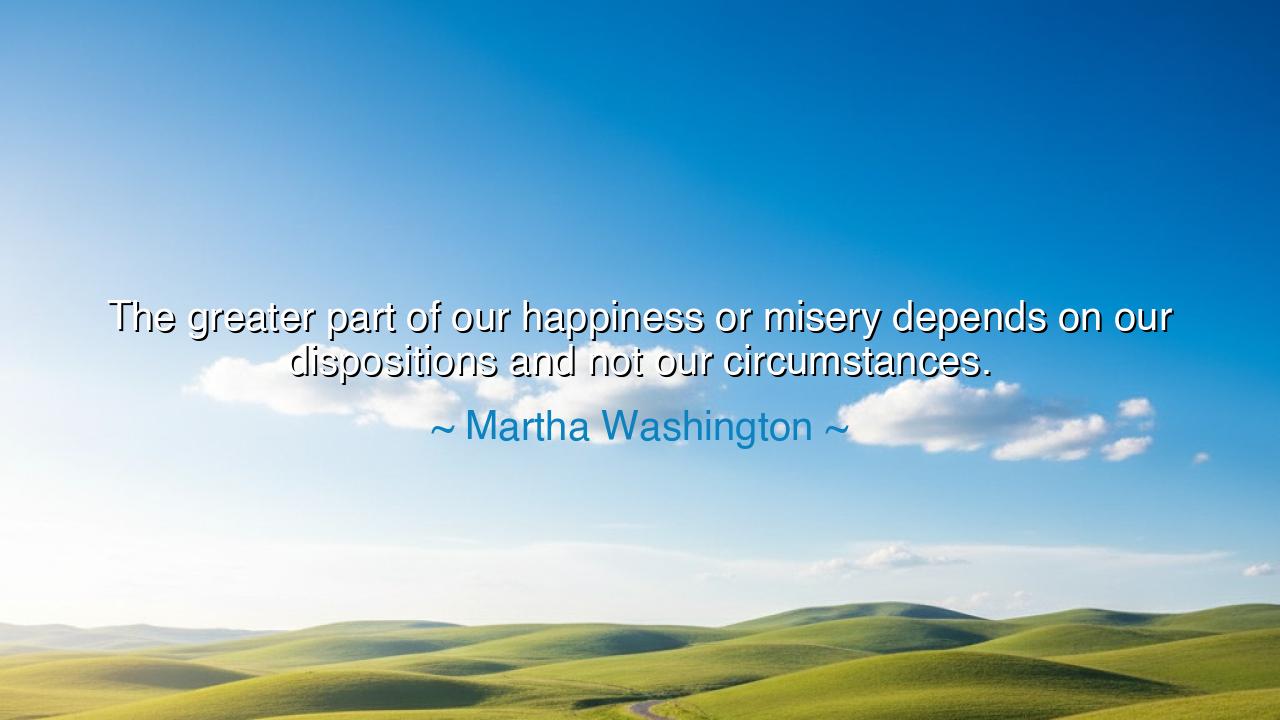
The greater part of our happiness or misery depends on our
The greater part of our happiness or misery depends on our dispositions and not our circumstances.






When Martha Washington, the first First Lady of the United States, declared that “The greater part of our happiness or misery depends on our dispositions and not our circumstances,” she spoke as one who had walked through the fires of both glory and grief. Her words are not the musings of comfort, but the hard-earned truth of a soul tempered by trial. In them lies an eternal lesson—that the true seat of happiness and misery is not the world around us, but the heart within us. For fortune turns like the seasons, yet the spirit that governs itself stands firm through storm and sun alike.
Martha Washington had seen both abundance and loss. She knew the loneliness of war, as her husband George Washington fought for a nation’s freedom, and she endured the weariness of waiting through bitter winters at Valley Forge. Yet even in hardship, she refused despair. Her letters speak of gratitude, of steadfastness, of faith. She understood that circumstances—wealth, comfort, victory—are but fleeting shadows; but disposition, the inner posture of the soul, is enduring light. In those cold days when the young republic trembled, it was her calm strength, her serene temperament, that steadied not only her household, but the heart of her husband and those who looked to them as symbols of a struggling nation.
The ancients too knew this truth. The Stoic philosophers—Epictetus, Seneca, Marcus Aurelius—taught that man cannot control the winds, but he can adjust his sails. They believed that virtue and attitude are the anchors of the human spirit. Fortune may strip a man of his possessions, his titles, even his body’s strength, but never his power to choose his response. So it was with Martha: though war and loss encircled her, her disposition remained tranquil, her heart undiminished. She lived by a wisdom older than empires—the wisdom that peace is born within.
History offers countless echoes of her truth. Consider Viktor Frankl, the 20th-century psychologist who endured the horror of Nazi concentration camps. Surrounded by misery beyond words, he wrote that even there, man’s last freedom was to choose his attitude. He found purpose in suffering, dignity in despair, and meaning in endurance. Like Martha, he understood that circumstances can imprison the body, but they cannot imprison the mind’s disposition unless we allow it. From such souls, the world learns what it means to triumph inwardly even when outwardly all seems lost.
Happiness, then, is not the absence of pain, nor is misery the inevitable companion of hardship. They are the reflections of our own hearts upon the mirror of the world. The bitter man will find bitterness in every dawn; the grateful man will find beauty even in twilight. Thus, to cultivate one’s disposition is the highest art of living. It is the philosopher’s discipline and the saint’s serenity. It requires daily tending—gratitude in place of complaint, patience in place of haste, hope in place of fear.
Let the seeker of wisdom, therefore, turn inward. Ask not, “What does life give me?” but, “How do I receive it?” A calm spirit can walk through turmoil unshaken, while an anxious one can drown in ease. When joy fades, remember that the well of peace lies within, not without. Train the mind to see good even in trial, for every hardship bears a hidden seed of strength. As Martha Washington herself said through her life’s example: when you cannot change the storm, you can still change the way you face it.
So, my child of reflection and courage, carry this truth as armor against the tempests of the world: your disposition is your kingdom. Guard it well, for no thief can steal it, no tyrant can command it, no tragedy can extinguish it. Whether the path is smooth or steep, your inner compass will determine the joy or sorrow of the journey. Choose gratitude over bitterness, hope over despair, and you will find that happiness is not a gift the world bestows—but a flame that you kindle within your own heart. For indeed, as Martha Washington taught, the measure of a life is not in its circumstances, but in the spirit with which it is lived.






AAdministratorAdministrator
Welcome, honored guests. Please leave a comment, we will respond soon